| Italians
Arabs of Europe
Once an Iraqi boy told me: "You Italians are the Arabs of Europe." Looking to the Mediterranean you can be seen a large lake which for centuries has united peoples settled on mutual banks. Peoples throughout history have been mixed, torn, respected, until you find a balance: a Pax Mediterranean.
The recent visit by Gadhafi must therefore be seen in a less exotic than what you believe and let believe: after all, Libya is the bridgehead of a world, the Arab and wider African one (hic sunt leones), which with southern Europe has a close intense interchange.
Gadhafi arrived in an adrift Italy. No prospect of real development without planning policy around which a people can build a common dream. In this sense Italy effectively becomes a remote province of a continent that history has relegated to the margins of the positions that count: the garden of the world Africa, plundered in its resources in materials as well as human resources. And Italy, which fears being Africanized by Gadhafi as the rest of Europe, is already well under way of this path. And there is no need to refer to the invasion of immigrants instrumentally, on which fear played the wily Libyan leader: Italy has Africanized itself because of the Italians, who lost control of a state that now more than ever treat them as subjects by replacing privileges to rights.
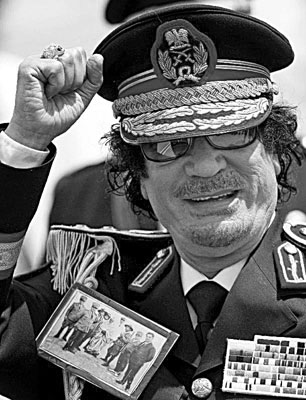 |
Mu'ammar Gheddafi |
Gadhafi arrived in an Italy adrift and he, pan-Arabist, dictator, a former Socialist, plays his cards, oxygen for stale economy from apoplectic strokes. In Italy we need Gadhafi. The orders, which looks to his circus, applauding his Koran lessons, and listening to his cousin as his crazy utterances, have given the future economic lifeblood to Italian companies have a point scored in a game that we continue to procrastinate, that of reality Italian economy, regardless of government propaganda. A sap economic, investment in Libya, which must absolutely draw on, the real politik teaches us that since the money does not have color, now that there are not, any color is allright if you find them.
And so a nation bends to blackmail. She bends to the theater of a nation of a political leader and shrewd sailed arriving in Rome, said the agenda and issues ultimatums and proclaims. Immigration and investment. The scale of our harlequin desert has these two dishes. Investment and their needs, it seems that we both agreed to a free zone in Libya, where small and medium-sized Italian companies can operate by exploiting the facilities, has already been discussed. Italian politics abdicates its role as economic driving up the fly on the boat this entrepreneur state.
And immigration. The theme of immigration, you know, you know, is dear to all. Italy then becomes a platform from which to launch challenges and provocations throughout Europe. Gadhafi knows the reality that presses behind the Libyan nation: millions and millions of dispossessed by history and corruption that are pressing to escape to Europe to collect what they think may be wrong in a better future. He wants 5 billion a year to stop this exodus. We are threatened. He takes our politicians for the belly, and relies heavily on fear of invasion. Europe until the invasion will remain geographically the natural landing place for these people. Gadhafi can not do anything against that. It can only try to exploit, in his view, the irrationality with which the majority of Europeans is tackling the subject.
The invasion was well underway and unstoppable. The Western world carries in his being the responsibility of the exodus. The European welfare states will collapse right in case the phenomenon should increase in the short to medium term, but like trying to save goat and cabbage? There are solutions beyond the Libyan blackmail?
Of course there are, but no one has nominated at the absurd and sad spectacle seen in the past days.
Investing in developing countries so that people, the best of youth, is about to leave at any cost, you do the math, and finally having the opportunity to live in dignity in their own country, decides to stay. Go ahead on this road is the only possible solution, the only rational solution that looks to the world of the twenty-first century for what it is, analyzing the history and the dynamics that have brought us this far.
Gadhafi is nobody, because nobody, even with 5 billion per year can block a movement epoch, the mass migration that characterize this moment when the world and the human being seeking new forms of an increasingly uncertain future.
As arab in Europe the Italians, we Italians, we must see beyond our nose, look at the shores of the Mediterranean that we are facing, rebut the hysteria arguments, not even once silenced when the irrationality suggests the shortest way to the ultimate disaster. That breaks down because of a humanity that is unable to guarantee the dignity of its people. Whatever their origin.
 Fabrizio Dentini Fabrizio Dentini
Translation by Enrico Massetti ("The other Fabrizio")
Remembering Colin Ward
In London
It was a hot and demanding day, but rewarding in the end the two hundred people crowded a quiet corner of Red Lion Square, central London, walking and talking for three hours on the Colin Ward Memorial Event, Conway Hall, London, July 10, 2010.
The funeral of Colin Ward, on 1 March, had brought to mind the spirit of man and irony, while this initiative is rather focused on his public figure, his political vision and the impressions he has left to those who have worked with him.
The first two speakers were, as is proper, the main promoters of the event. Ken Worpole, editor of the book in honor of Colin Ward, Richer Futures, created the right atmosphere with a friendly welcome to the participants, telling how he had met Colin in the early seventies, and explaining the features of absolute originality of Colin as a theorist and as an environmentalist educator. Colin's wife, Harriet, has given us a portrait of the man so intellectually fascinating, that she had met at a refresher course for teachers in 1965.
Stuart White, author of the book Making Anarchism Respectable, has provided a thorough analysis of the position of Colin in the overall political context and was conveniently followed by the intervention of Peter Marshall, author of Demanding the Impossible: A History of Anarchism, which examined Colin's position within the anarchist tradition.
These measures were all presented at a music stand to the left of the stage, while a large screen at the center showed a picture of Colin in his typewriter. Then the screen is animated and the director Mike Dibb played part of his DVD, Colin Ward in Conversation with Roger Deakin, in which Colin spoke of his involvement in the trial of the editors of Freedom in 1945.
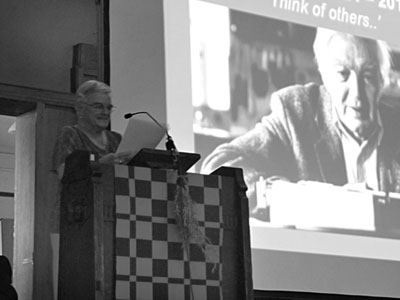 |
Londra, Conway Hall, 10 July 2010. Harriet Ward remembers
her husband Colin
(in the background in the dia)
during the initiative in his memory |
With another change of atmosphere, my brother Tom was put at the top and has stayed with me while singing an American song of the twenties, my father was listening pleasure and we appreciate the words: Always Lift Him Up (And Never Knock Him Down ). The song begins:
When a fellow has the blues and feels discouraged
And there’s nothin’ else but trouble all his life
When he’s always grumbled at and never happy…
Do not fail to lend a hand and try to help him
Always lift him up and never knock him down
In the seventies the assistant to Colin, who was responsible for the education of the Town and Country Planning Association, was Tony Fyson, who was happy to share his personal memories of working with him and to list the musical repertoire, from opera arias to those of the music hall, that Colin used to sing in the office.
Dennis Hardy, Colin co-author with two books published in the eighties, said that both had fun in their rounds of field survey, interviewing people and looking at both urban and rural environments, to obtain data on which to write.
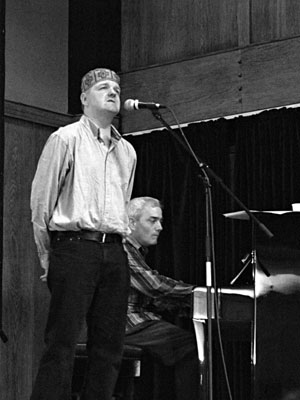 |
Ken Worpole, the organizator of the event
in memory of Colin Ward |
Krznaric Roman spoke on Colin's role as an educator with an eloquent speech, Eileen Adams, who was his associate in the seventies in the project Art and the Built Environment, gave an affectionate remembrance of how "I always left in the shit, but was always ready to get out of"
Peter Hall, who worked with Colin for the book Sociable Cities, and is now the chairman of the TCPA, gave an amusing description of the difficulties to convert typed text in documents used by Colin on his computer. The last contribution to the event was that of the geographer Brian Goodey, who recalled a number of Anarchy of 1968, which contained an article on Bob Dylan of the late Charlie Gillett, who was to become a world famous music critic.
On the back of the room were placed several stands with books by Freedom Press, Housman's Bookshop and Five Leaves Publications, whose founder, Ross Bradshaw, had helped to organize the event. Its publishing company, Five Leaves, published and reprinted many books by Colin Ward. It was also for sale Harriet Ward's book about his father, A Man of Small Importance, along with postcards of a drawing depicting Colin, Simon the work of James Farr, in 1990. Dan Poyner presented a maquette of a book project that will gather in the covers of the magazine of the sixties Colin, Anarchy, along with a collection of many photos and other memorabilia of his life.
Among the many speakers, were also present the closest relatives of Colin, including sister Kate, Sue's granddaughter, grandson Colin, cousins Barbara and Tony, who in 1991 had worked with him for - guess what? - A book.
 Ben Ward Ben Ward
Translation by Enrico Massetti ("The other Fabrizio")
Violence and precarious
Work ethic
Nobody likes Violence, except for sadists. Nobody would like to become the target of a verbal dispute, much less aggressive smoking bombs, while from the stage of the party that wants to be the alternative to PDL power, there is going to discuss the prospects of the Italian labor market. Bonanni, general secretary of CISL was attacked, challenged and made his escape before the intervention. Some considerations concerning seem dutiful, more in the light of the statements made later that the dispute as such. For human redundancy in production or for a young, insecure, flexible, clearly on the edge of a country on the brink of the abyss, in fact, the reasons for objection can be a rather obvious and therefore the reaction to this verbal attack, which should stimulate deep reflection.
It has been expressed by many a total disrepute and blame in general for those who have permission, clearly outside parliament, to stop a rally organized by an institutional entity. Also the words of Bonanni’s complaint clearly fit in the dimension of reality from which it was born: the total lack of interest in the problems of the institutions born in the wake of increasingly pressing global challenges. In total lack of interest, and is even worse, the blatant misrepresentation of the nature of the complaint: "They were young, the social centers. They were workers. It is the people going to do violence to the stage, practitioners of violence, which of course in the face of frantic tone of recent times tried to insert. For this reason, some would do well to tone down the rhetoric." This is not a political response attack, but a narrowly degeneration, more or less consciously, according to the intellectual honesty Bonanni, the analytical capacity of today. They were workers, perhaps Bonanni has this instinct to be able to understand the trade-union employment contract, the category directly at first glance. They were not employees, so do not even have the right to speak, appears to be under understood, let alone if they can afford to challenge. In this post-modern society, who does not work, we are reminded of the Bonanno, has no social status that they can live fully their citizenship. And here's the link to play the same dispute. Who is contesting in the finals?
Irreducible to those who feel betrayed that the institutions are making on the backs of workers. Betrayed by a government, even if that very right, in theory, should protect its own people elector, betrayed by the workers unions that sell to corporate guidelines, betrayed, and blackmailed adrift with all the country to pursue in solitude and against the centrifugal forces of globalization, the conflict between capital and labor law, now only a longed-for work and existential dignity.
The metal workers today have no national agreement, the hard core of the Italian job, the legendary blue-collar, are being broken, lost all bargaining power on the path of negotiation for the value of labor supply, and this for three main reasons: because Fiat has become like all the global corporations, extraterritorial power, not limited to the country of origin and with no prospect of membership in the national geographical constraints because the government has good game, the easiest, followed by the either/or of charges of industrial Marchionne, as the only solution because only the final proposal and the union policy because of so-called allies (CGIL, CISL and UIL) has pursued a path of confrontation, in view of it is not clear on what benefit, if not prestige staff at the tables of transnational capital. It is the Italian-worker that has been sold, thanks to the logic of global competitiveness and production.
Undoubtedly, the political union has failed in recent decades its primary purpose. The proper protection of the worker. Today also metalworkers sail to the port of insecurity, with the hypothesis put forward and now more and more of the next individual bargaining: an abomination in terms of union. Meanwhile, Federmeccanica tearing up the old national contract of 2008, leads the Italian labor market, since the referendum of Pomigliano d'Arco, to the final de-legitimization of the worker as a bearer of rights, rights that are interpreted in the overall logic of maximization of profit and cost reduction, as dangerous tools that intervene to prevent what the industry leaders instead want to promote. The internal competition for the working class of the twenty-first century, but not, as you might think, for the highly-meritocratic logic needed in this country, but the logic of blackmail at the expense of their colleagues, a majority of workers taken by the throat and increasingly in need of work. For this reason, Bonanni can say that the FIOM instrumentally, in his anti-democratic union did not reflect the will of the majority of workers. The majority of them with water in the throat is forced to sell themselves, more or less consciously, just to be able to work, only to have the right to continue living, still worse, of their work. Pour out of the game industry has a sense of self detrimenta to discover the strategy of Italian trade unions who over the decades to defend the interests of all (including those who did not deserve it but were affiliated), have come to make a resounding failure, from the point of view of the work ethic: to allow the blackmail, which is now legitimized by the individual contract, who has always taken advantage of acquired rights, so the union would not allow any removal action by management. The first word was blackmail the workers to other workers, and on this there is little to complain about. We must simply admit it. If Marcegaglia then states that the cancellation of the contract by National Federmeccanica is a measure of clarity, then touches the metal workers now make clear in their ranks, to take up the cause with a sense of relentless challenges to which they are called.
A national referendum among blue-collar seems the way to go as quickly as possible, because while the speed of the raptor capital leaves no time to ponder the best decisions, and while the unions are pursuing their own political prestige, to the workers remains now only, and for a short time to decide how best to choose to work to live or live to work.
 Fabrizio Dentini Fabrizio Dentini
Translation by Enrico Massetti ("The other Fabrizio")
Who killed
Vladimir Vysotsky
It was believed he died of alcohol and despair
Rome - Vladimir Vysotsky was a myth in the leaden USSR of the seventies. Poet, singer and actor he had a huge following among young and nonconformist. His songs were banned for their irreverent tone, but the tapes circulated underground in the millions. It all ended twenty years ago, on July 25, 1980: the irreverent minstrel was only 42 years when he left for ever: heart attacks and alcohol abuse, these are the official cause of death.
But now new evidence shows that there is no question of a life in an almost burnt out too quickly, however, voluntary and self-destructive, but assassination organized by the KGB - the legendary secret services of Soviet communism - to get rid of a embarrassing dissident.
This is what wrote Marlena Zimma, author of a book entitled "Who Killed Vysotsky?", Soon to be published, of which anticipated the main passage in an interview appeared on the Polish newspaper "Rzeczpospolita".
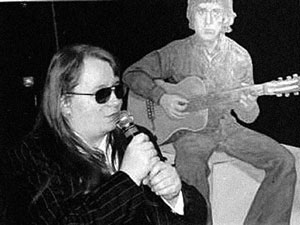 |
Marlena Zimma |
Mrs. Zimma claims to have met the 'bard' dissident’s doctor shortly after his death. "We have done a brilliant little work," he revealed, explaining that he and the KGB agents blocked the minstrel, bound him and made him ingest toxic substances, tranquilizers and alcohol. In these conditions - also said the doctor, who died shortly after, also in unclear circumstances - Vysotsky choked.
The death of the 'bard' created trauma among young Russians: his funeral was an impressive crowd that had learned to love his the pirate music. Also played an important role in the ex-wife, actress Marina Vlady, who has done much to keep alive the memory of the great poet, recording songs in France. Already a cult figure to life in the USSR and in Eastern Europe, it became even more so after death. For years and years thousands of people commemorated the anniversary of his death, while still on his tomb in the cemetery in Moscow Vaganovskoye never lack fresh flowers.
Since the perestroika of Mikhail Gorbachev enabled the official sale, his records have sold a hundred million copies, foundations were headed and erected statues.
 Marlena Zimma Marlena Zimma
Translation by Enrico Massetti ("The other Fabrizio")
Greece /
Self-managed restaurant
From June 7, the restaurant Barthelonika in the center of Thessaloniki is working as a self-organized, managed by its workers. It all started when the restaurant owner announced to employees that the restaurant will close for three months during the summer and will decide his fate in the month of September. The workers, for their part, say the business is in profit and there is no reason to suspend its operation.
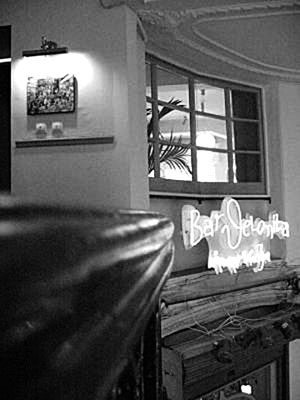 |
Thessaloniki (Greece).
The self-managed restaurant Barthelonika |
And so they made an informal agreement under which the workers will take over management of the restaurant for two months, so that they can avoid to become unemployed. Now, as we are told, the restaurant Barthelonika "works normally, without owners, managers and hierarchical relationships. We all decide together on the whole, we find the suppliers and we take care of the place. In this climate of crisis, if we accept the decisions of masters without reaction will be taken directly to the abject," it stresses.
Immediately after assuming the management of the restaurant, workers have applied a 30% discount on all meals and invited the people of Thessaloniki to support this project of self-management. One Sunday in June, the kitchen of Barthelonika was transferred to the Anti-Racist Festival, where workers have decided to participate in and cook for visitors.
(Source: the newspaper O Greek Dromos
Thanks for your cooperation to Enrico Massetti)
Hunghary
/
Back to the brown plague
For many Hungarians the word "Trianon" evokes the worst disaster in the nation. But not everyone seems to be clear about this.
In a lot of graffiti on a few posters and slogans in the streets, Trianon is evoked as an individual responsible for the destruction of Hungary. In the right-wing populist events happen to hear you cry: "Trianon, come here if you dare," as the journalist Joelle Stolz reported. It is actually the name of the building where on June 4, 1920, in France, a treaty was signed which cost to Hungary about two thirds of the national territory, as a result of the Habsburg defeat. In 1938, choosing to side with Nazi Germany, Hungary dreamed of finding the old boundaries and, although it became a member of the European Union, the hope is still alive. The Hungarian far-right has tried several times to mobilize the Hungarian minorities in neighboring countries as well as the Budapest Parliament does its part. On May 26, presented by the Christian conservative party Fidesz, has been adopted an amendment to the nationality law that allows each member of the "Magyar race" to apply for a Hungarian passport (nicknamed "passport Trianon") even without the residence. All you need is to have Hungarian ancestors and to speak the language. Theoretically could be enough for three and a half million people living in Slovakia, Serbia, Romania, Ukraine and Croatia. In January 2011, Hungary should take the EU presidency, but the "risk of destabilization in Eastern Europe", as reported by the Austrian journalist Gregor Mayer, remain consistent. Many leaders of Fidesz feel "victims of historic injustice," while the party Jobbik (xenophobic and anti-Semitic) explicitly claim the restitution of what was lost with the Treaty of Trianon.
Gabor Vona, leader of this organization which is considered the heir of the Arrow Cross (Nazi collaborators), has defined Hungary an "occupied territory". Other members of this far-right party have claimed the agreements by which Hitler had returned to his Hungarian allies certain areas of Slovakia.
In a hitherto unpublished version (and even more paranoid) of the "Zionist conspiracy", Gabor Vona claims publicly that Israel was seeking to "buy Hungary through German intermediaries to have a refuge in Europe" in the case came out in defeat in a future Middle East war. Hungary has adopted in February, a law punishing Holocaust denial, the right-wing press is becoming more and more violently anti-Semitic. They came to seek the removal from the libraries of some Hungarian Jews writers calling them "traitors." For the far-right populist, the Jews would be "jointly responsible for both the repression by the communist regime that the current neo-liberal drift." In addition to Jews being targeted by racists are the Roma, about 600 thousand people. Sedentary for five centuries, the Roma in Hungary live mainly in the northeast, near the border with Slovakia. In the past, the disappearance of traditional jobs was offset by "social cooperatives" in industry and agriculture. By the end of state communism, things have worsened. If the current level of unemployment reached 14% in Hungary, in the Roma is about 90%. The only resource is represented by social benefits, usually associated with community work such as cleaning the streets. Poor also is the political presence. In the last election there were only four candidates of Roma origin, one with the Socialists, another with Fidesz and two independents. Supplying art to fear for the "Gypsy crime" and their "uncontrolled fertility," the party Jobbik organized patrols and militia. In the last years of racist attacks against Roma would have caused six deaths and many wounded. On May 22, 2010 a delegation of Jobbik attended the event organized by Forza Nuova in Milan.
 Gianni Sartori Gianni Sartori
Translation by Enrico Massetti ("The other Fabrizio")
Mastrogiovanni
and the Fisherman-Mayor
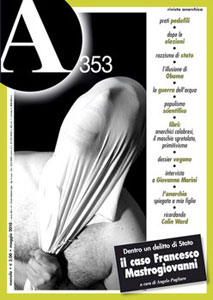 Bologna, Pisa, Verona, Salerno, Ancona, Caserta, Trieste, Vallo della Lucania, Perugia, Genoa, Massa, Cosenza are just some of the sites where have taken initiatives and events to demand to shed light on the death of Francesco Mastrogiovanni, the libertarian teacher died August 4, 2009, after 83 hours of restraint at the hospital of St. Luke Vallo della Lucania (SA). Bologna, Pisa, Verona, Salerno, Ancona, Caserta, Trieste, Vallo della Lucania, Perugia, Genoa, Massa, Cosenza are just some of the sites where have taken initiatives and events to demand to shed light on the death of Francesco Mastrogiovanni, the libertarian teacher died August 4, 2009, after 83 hours of restraint at the hospital of St. Luke Vallo della Lucania (SA).
A few days before he left for Massa and Cosenza, to give birth to two other initiatives, in-Pollica Acciaroli, a charming village of the Cilento, was brutally murdered by the Camorra clan, the Mayor Angelo Vassallo, which issued the order for TSO (Treatment Compulsory Health, practically forced the shelter) against Mastrogiovanni. In the hours following the tragic murder took place in Pollica a vigil candlelight of solidarity and protest which was attended by representatives of the "Committee for Truth and Justice Franco ... and never again." Some representatives of the Committee, including Giuseppe Galzerano, Giuseppe Tarallo and Vincenzo Serra took part, alongside the local population, at the funeral of the fisherman mayor, as he was called by his countrymen.
With Angelo Vassallo we lose a director who, as stated by his brother Claudius, was alone in the fight against the mafia so prevalent in the Cilento (who had confided a few days before he was killed, that "law enforcement people were in collusion with unsavory types"), an important witness to understand how and why, that morning in late July 2009 (at 8.30, as shown by the minutes of the police) decided to issue the TSO that led to the hospitalization of at Mastrogiovanni Hospital psychiatry department of lager Vallo.
Despite the sad events, the Committee has confirmed participation in the two planned initiatives. Workshops at the Social Centre Babylon of Cosenza, in collaboration with the eco-social Malatesta of that city, Saturday, Sept. 11, at 18.30 after the screening of the movie taken from the RAI program "Mi manda Rai Tre", took the floor Oreste Cozza (weekly contributor to the anarchist Umanita’ Nova), Angelo Pagliuca (Committee for Truth and Justice Franco Mastrogiovanni), David Colace (CGIL Cosenza), Serra and Vincenzo, brother of Mastrogiovanni, who went to Calabria to update these as well as on developments in the investigations, the dates of the next hearing of the process with immediate feedback.
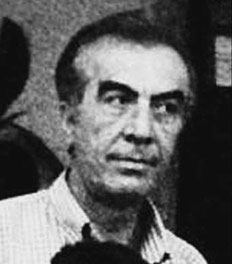 |
Francesco Mastrogiovanni |
The debate was followed by a “delusional buffet" based on Calabrian typical products, all drenched in "stain" wine offered by the FAI of Albanian Spezzano. In a completely fogged by the special effects obtained by the smoke of Tuscan cigars Domenico Liguori, Alessio Lega has performed in a concert that he called family, given the small presence of the public. The Lecce storyteller presented, among other pieces, the Mastrogiovanni ballad for the drafting of which has contributed Ascanio Celestini. While preparing for a new appointment in Rome, at the anarchist club Carlo Cafiero, the same evening of Saturday, September 11, Massa, in the course of three days “Anarchy in Festa", a debate was held against the state murders. Presented by Fran Serantini, the Library "Franco Serantini” of Pisa (in fact dedicated to the memory of a young anarchist beaten by police and left to die in prison 38 years ago) have spoken, Giuseppe Tarallo, chairman of the" Committee for Truth and Justice Franco Mastrogiovanni” (www.giustiziaperfranco.it), the father of Carlo Giuliani - a testimony both simple and exciting - the afflicted, dignified and combative parents Stefano Cucchi.
(Thanks for your cooperation Angelo Pagliaro)
Translation by Enrico Massetti ("The other Fabrizio")
Sacco and Vanzetti,
a great heritage
but not of all
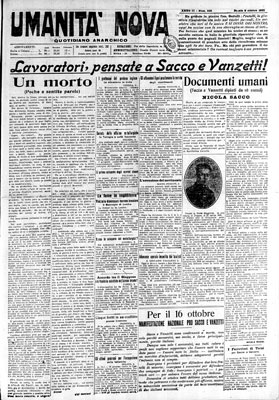 A few hours have passed since the news agencies have released the news that the Hon. Antonio di Pietro has "opened" in Torremaggiore (FG), the Association Sacco and Vanzetti who do not wait for the initial reactions in the press. Various Web sites and blogs are flooded with e-mail from critical content such as: Hon. di Pietro is not the one who voted against the establishment of a parliamentary commission of inquiry into the brutality of the G8 in Genoa in 2001? But Di Pietro is not the largest parliamentary Italian history knows that the executioner? And so on! A few hours have passed since the news agencies have released the news that the Hon. Antonio di Pietro has "opened" in Torremaggiore (FG), the Association Sacco and Vanzetti who do not wait for the initial reactions in the press. Various Web sites and blogs are flooded with e-mail from critical content such as: Hon. di Pietro is not the one who voted against the establishment of a parliamentary commission of inquiry into the brutality of the G8 in Genoa in 2001? But Di Pietro is not the largest parliamentary Italian history knows that the executioner? And so on!
Of course, the second (sic) Association inauguration, this time by the Hon. di Pietro (the first was celebrated in August 2007 to mark the 80th anniversary of the double murder of State), is an act difficult to decipher. Giuseppe Galzerano, editor, writer and historic glimpse of a political speculation and human low-profile because, like many people who pay attention to political events are witnessing these days, in this bustle of Deputies, Senators, MEPs, which go all over and breadth of the peninsula, worried about the impending elections, rallying the most trusted carriers of votes, to give life to self-associations and foundations, and by proper intellectual and passionate he is, he wrote immediately to the press and to various libertarian Puglia newspapers which faithfully reproduce his words. His thinking is summed up by the media with the phrase: "What mix up Antonio di Pietro with Nicola Sacco and Bartolomeo Vanzetti?". Galzerano responded to the comments of many: Matteo Marolla (President of the Association and a leading authority in that city IDV), Tommaso Marabini, (an expert in the history of anarchism), to many citizens and even members the association's S & V, as Alberto Scudieri, who had already resigned and that now see confirmed the reasons for their dissent.
But the answer in less absolute respect for man and scholar Galzerano came precisely from the grandson of Nicola Sacco, Ms. Fernanda, which, inter alia, states: "As socialists, as we are the Sacco family, we always condemned his political convictions, but we have rebelled against his conviction for murder during a robbery. "It is precisely on these two points: the socialist traditions of family and the machinations hatched around the famous robbery that, here, we want to provide, to Ms. Fernanda Sacco and who continues to support his thesis, contributions and documentary references. Saturday, October 8, 1921, the daily anarchist Umanita’ Nova (153 years II) publish front-page autobiography of an agile Nicola Sacco (will do the same the next day, Sunday, Oct. 9, with Bartolomeo Vanzetti) entitled "Documents Human-Sacco and Vanzetti painted by themselves, "which states:" ... (...) ... I threw myself heart and soul into the fray: I became an organizer of meetings and conferences; briefly belonged to the Italian Socialist Federation. But the most eager to air, or wish to lose in sterile feuds that had culminated in an exaltation of a union working in competition to another, I was transported by my own passion and the will to do, free to the groupings until the day in the unlikely in the hands of shameless policemen caught me and I lined up for major reprisals of the enemy ... (....) .... ". Here, Ms. Fernanda Nicola uncle moved his membership to the anarchist movement with the beautiful words "more eager to air" without condemning the Italian Socialist Federation, where he played but noting, with a thin vein criticism, the fact that, in his view, the socialists were losing struggles in sterile also promotes a kind of competition between the various workers' organizations.
Regarding the second point, namely the famous robbery for which they were arrested and later convicted of murder during a robbery to which Mrs. Fernanda rebels and that "communicates" to young people in schools, "without political interests" I must say that, although not prepared to consider the political interests, at least recognize the political motives of the arrest of two Italian immigrants to know which, again, we are in the help documents. Let us read once again, Umanita’ Nova (Year II No. 152) Friday, October 7, 1921, in the first page, an article titled "Why were arrested Sacco and Vanzetti" - The deal Salsedo where you tell the steps that led the arrest of two: "... (...) ... one of the reasons why the cops of Massachusetts laid eyes on the two Italian workers, besides the fact of their ideas they profess and nationality to which they belonged - and Italians were so people just, capable of all the black crimes - was to have them actively engaged in case of their compatriot and fellow Andrea Salsedo ideas, and grabbed mysteriously detained at the police station in New York, along with another Italian companion, Roberto Elia. On May 3, 1920, Andrea Salsedo fell from the window of his cell at, as we said on the fourteenth floor of the skyscraper, and crashed his skull on the pavement of the busy metro thoroughfare... (...) ". That's why Giuseppe Galzerano and more questioned in his first footnote states that nothing or very little is known about the story of the two anarchists brutally murdered on an electric chair.
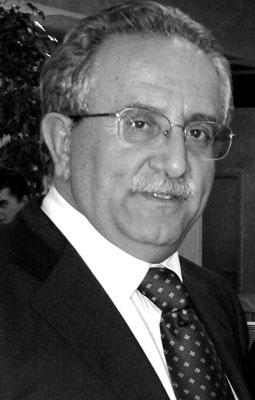 |
Giuseppe Galzerano |
Had only been enough to read a good part of the imposing mass of court documents and some articles in the press at the time to understand that the real reason why Nick and Bart were arrested, go far beyond one, albeit serious, armed robbery. In the article published by Umanita’ Nova shows that they needed to make false accusations in the amount of a certain gravity and especially since none of these could be demonstrated if not resorting to the usual false testimony from seedy characters and collected by the courts overflowing with hatred for Italians emigrants and rebels. Sacco and Vanzetti were arrested on a streetcar in Brockton and Bridgwater May 5, 1920, before being able to hold the rally that was to take place in Brockton on May 9 to demand truth and justice for Andrea Salsedo, on charges of possession of flyers that advertised the initiative and two pistols. Meanwhile, however, were accused of double murder of an accountant and a guard's shoe "Slater and Morrill," crime that took place on April 15, more than two weeks before their arrest.
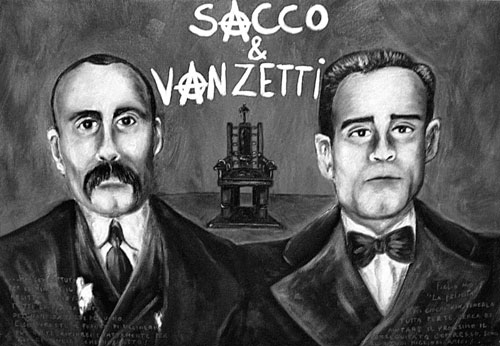 |
Sacco e Vanzetti, olio su tela 40x60, 2002 |
The story of the long process farcical and tragic epilogue we know it! While the Democrats from around the world mourned the death of Nick and Bart, a few months following the execution of a slave, the owner of a tobacco factory, started going around telling of being so unhappy at the death of two Italians. He said to want to commemorate with a brand of cigarettes that would have brought their names, but, more importantly, would allow him handsome profits. With the help of a third party came in contact Nicola Sacco's wife Rosina Zambelli which, after reading the letter, shook his head and said no, would not have consented to such an operation.
 Angelo Pagliaro Angelo Pagliaro
Translation by Enrico Massetti ("The other Fabrizio")
(Thanks to Franco Schirone for the documentation provided)
In Gallico (RC)
Remembering the five
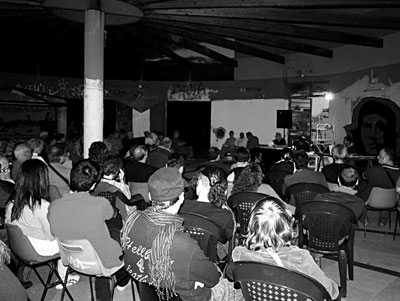 Sunday, September 26, at the CSOA Angelina Cartella di Gallico (RC), organized by Reggini anarchists, Gruppi Anarchici Casentini and Federazione Anarchica was held the announced meeting on the 40th anniversary of the death of fellow anarchists Angelo Casile, Franco Scordo, Gianni Aricò, Annaliste Borth, Luigi Lo Celso, occurred under circumstances still shrouded in a mystery that has become a constant in Italy since the massacre of Piazza Fontana. Sunday, September 26, at the CSOA Angelina Cartella di Gallico (RC), organized by Reggini anarchists, Gruppi Anarchici Casentini and Federazione Anarchica was held the announced meeting on the 40th anniversary of the death of fellow anarchists Angelo Casile, Franco Scordo, Gianni Aricò, Annaliste Borth, Luigi Lo Celso, occurred under circumstances still shrouded in a mystery that has become a constant in Italy since the massacre of Piazza Fontana.
The day, still summer, in a pleasant and functional space, saw an unusually wide participation, constituted in part by fellow members of the generation of the '70s, in part by fellow children and young people. In fact, the real theme of the day, already the intention of the organizers, wasn’t the commemoration of the comrades and even providing a tune-up on the search for clues that could reconstruct a dynamic less smoky than the facts revealed by the investigation. More correctly, as has already been well explained in the introduction made by Pino Vermilion, the problem was to bring to the attention of young people today a sense of political experience and the thickness of the young anarchists of the late sixties and the beginning of the seventies.
These fellows not only claimed, in the tide of Leninist acronyms, the value of anarchist ideas and practices, but they were deeply immersed in social struggles, and simultaneously demanded an active and leading role in the theoretical, the redefinition of policy objectives and organization proposals of the anarchist movement. We wanted, in short, seek to strengthen a weak link made dramatically by the inconsist number of the middle generation, those born and brought up his companions in the aftermath of the massacres of state and so-called years of lead.
Significant in this regard, the decision to propose a pamphlet with two short texts, one of Bruno Misefari of 1920, the other of Anarchist Youth, 1967, explaining who they are and what the anarchists want.
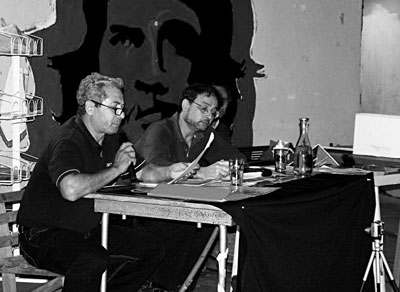 |
Pino Vermiglio and Natale Musarra |
Natale Musarra, the Historical Archives of the anarchists in Sicily, in a rich and valuable assistance, recounted the highlights of the experience of phages, reports from a part of the movement nationally and internationally, on the other the size of the local group of Reggio Calabria . From the documents analyzed indicate that this group, thanks to the great intellectual qualities and strong personality Casile, was particularly advanced in theory and, therefore, had strong and close relations with the local anarchist and libertarian in most of Europe.
Angelo Crea, known as Bonzo, who shared action with fellow dead militants, described the political and social environment in which the group moved, emphasizing its roots in the social struggles of the territory and the plight of the anti-fascist practice, in a Reggio in which there where armed squads, under the orders of politicians and criminals, under the protection of so-called law enforcement.
The lawyer Pino Morabito, who along with fellow lawyer Placido La Torre was defending the Reggio anarchists, gave an overview of their highly accurate title role in legal proceedings, a result that had taken the leading role in social and political discourse of the city.
Many the interventions, especially by those who were comrades in arms or personal friends of fellow victims of the accident. The debate was lively, but, apart from the points of view expressed a unanimous opinion: the Reggio companions were very young, but they were not naive and did not do folklore. They were prepared culturally, were appreciated humanly, they were met politically. For this reason they were a bad example, to stop in every way, with intimidation, stabbings, prison, death.
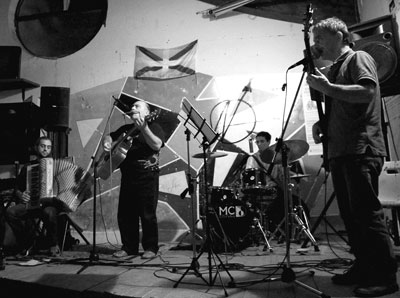 |
I Suonatori Libertari Calabresi |
In closing, the intervention of Domenico Liguori, of the spixana Anarchist Federation took its cue from the experience of fellow political and Reggio group to indicate the need for social roots of the anarchists, who must feel proud to return to their voice in small and large battles, beginning with those of its territory.
The group of Suonatori Libertari Calabresi played some songs from their latest recording “Quanno vene l’Anarchia” and three young artists have interpreted and put to music some poems of Bruno Misefari.
 Antonio Squeo Antonio Squeo
Translation by Enrico Massetti ("The other Fabrizio")
The photos in this article are by Antonio Squeo and Alessia Stillitano. |

